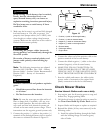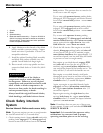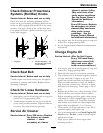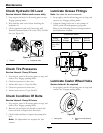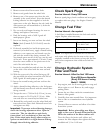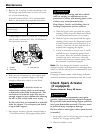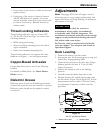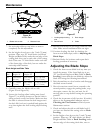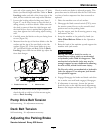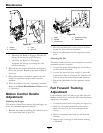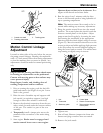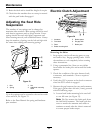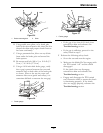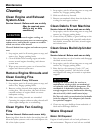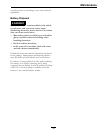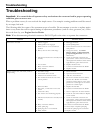
Maintenance
each side of the cutting deck. Place two “A” thick
blocks (see Block Height and Rake Table in Deck
Leveling) under each side of the front edge of the
deck, but not under the anti-scalp roller brackets.
7. Loosen the leveling adjust locking nuts (item 1
Figure 27) on all four corners so that the deck is
sitting securely on all four blocks. Make sure that
the slack is removed from the deck hangers and
the deck lift foot lever is pushed back against the
stop, then tighten the four leveling adjust locking
nuts.
8. Carefully rotate the blades so they are facing front
to rear (Figure 28).
9. Measure from the tip of the front blade to the at
surface and the tip of the rear blade to the at
surface (Figure 28). If the front blade tip is not
“R” (see Block Height and Rake Table in Deck
Leveling) lower than the rear blade tip, adjust the
front deck hanger.
Figure 28
1. Blades front to rear
2. Measure here
10. When the front-to-rear blade slope is correct
check the side-to-side level of the mower again;
refer to Deck Leveling.
Pump Drive Belt Tension
Self-tensioning - No adjustment necessary.
Deck Belt Tension
Self-tensioning - No adjustment necessary.
Adjusting the Parking Brake
Service Interval: Every 500 hours
Check to make sure brake is adjusted properly. This
procedure must be followed after the rst 100 hours
or when a brake component has been removed or
replaced.
1. Drive the machine onto a level surface.
2. Disengage the blade control switch (PTO), move
the motion control levers to the neutral locked
position and set the parking brake.
3. Stop the engine, wait for all moving parts to stop,
and remove the key.
4. Setup the machine to be pushed by hand (see
Drive Wheel Release Valves in the Operation
section).
5. Raise the back of the machine up and support the
machine with jack stands.
CAUTION
Raising the mower deck for service or
maintenance relying solely on mechanical
or hydraulic jacks could be dangerous. The
mechanical or hydraulic jacks may not be
enough support or may malfunction allowing
the unit to fall, which could cause injury.
Do Not rely solely on mechanical or hydraulic
jacks for support. Use adequate jack stands
or equivalent support.
6. Engage/disengage the brake and check each drive
tire to make sure each brake engages/disengages.
7. If adjustment is necessary, loosen the jam nut
from the yoke on the side that needs adjustment.
Remove the hairpin and clevis pin (see
Figure 29).
37



